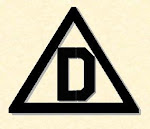In 2 Kings, it struck me the
way in which Scripture describes the reign of the kings of Judah and Israel.
One after the other, it describes in a short sentence, sometimes with and
sometimes without a subsequent commentary, how God rated their
performance.
Jehoahaz the son of Jehu: “And he did that which was evil in the sight of the Lord, and followed the sins of Jeroboam the son of Nebat, which made Israel to sin; he departed not therefrom.” - 2 Kings 13:2
Jehoash the son of Jehoahaz: “And he did that which was evil in the sight of the Lord; he departed not from all the sins of Jeroboam the son of Nebat, who made Israel sin: but he walked therein.” – 2 Kings 13:11
Jeroboam the son of Joash: “And he did that which was evil in the sight of the Lord: he departed not from all the sins of Jeroboam the son of Nebat, who made Israel to sin.” 2 Kings 14:24
Zachariah the son of Jeroboam: “And he did that which was evil in the sight of the Lord, as his fathers had done: he departed not from the sins of Jeroboam the son of Nebat, who made Israel to sin.” – 2 Kings 15:9
Pekahiah the son of Menahem: “And he did that which was evil in the sight of the Lord: he departed not from the sins of Jeroboam the son of Nebat, who made Israel to sin.” – 2 Kings 15:24
Pekah the son of Remaliah: “And he did that which was evil in the sight of the Lord: he departed not from the sins of Jeroboam the son of Nebat, who made Israel to sin.” – 2 Kings 15:28
All of these are kings who
“did that which was evil in the sight of the Lord.” But it gets more
interesting when we look at those who it says, “did right in the sight of the
Lord.”
Amaziah the son of Joash: “And he did that which was right in the sight of the Lord, yet not like David his father: he did according to all things as Joash his father did. Howbeit the high places were not taken away: as yet the people did sacrifice and burnt incense on the high places.” – 2 Kings 14:3-4
Azariah son of Amaziah: “And he did that which was right in the sight of the Lord, according to all that his father Amaziah had done; Save that the high places were not removed: the people sacrificed and burnt incense still on the high places.” – 2 Kings 15:3-4
Jotham the son of Uzziah: “And he did that which was right in the sight of the Lord: he did according to all that his father Uzziah had done. Howbeit the high places were not removed: the people sacrificed and burned incense still in the high places. He built the higher gate of the house of the Lord.” - 2 Kings 15:34-35
Amaziah the son of Joash: “And he did that which was right in the sight of the Lord, yet not like David his father: he did according to all things as Joash his father did. Howbeit the high places were not taken away: as yet the people did sacrifice and burnt incense on the high places.” – 2 Kings 14:3-4
Azariah son of Amaziah: “And he did that which was right in the sight of the Lord, according to all that his father Amaziah had done; Save that the high places were not removed: the people sacrificed and burnt incense still on the high places.” – 2 Kings 15:3-4
Jotham the son of Uzziah: “And he did that which was right in the sight of the Lord: he did according to all that his father Uzziah had done. Howbeit the high places were not removed: the people sacrificed and burned incense still in the high places. He built the higher gate of the house of the Lord.” - 2 Kings 15:34-35
There’s a pattern with those last three: the “high places
were not removed.” It’s been said that when the Lord says something multiple
times, that should grab our attention even more, because He’s emphasizing
something! They didn’t tear down the high places, where people were being led
astray from the Lord, even though they did right in the Lord’s eyes, generally
speaking. No doubt those high places would have been very difficult, and very
disruptive, to tear down.
So what are our “high places” today? It seems that any
difficult thing that stands in the way of bringing either ourselves, our
families, or our country, into greater fellowship with the Lord, would be a
“high place.” What would it look like to take down one of those “high places?”
It would be radical, brave, bold, and fearless. It might not be popular, but shouldn’t
we always want to do what God desires us to do? Let’s “tear down the high
places.”
_


No comments:
Post a Comment
I'd love to get your feedback!